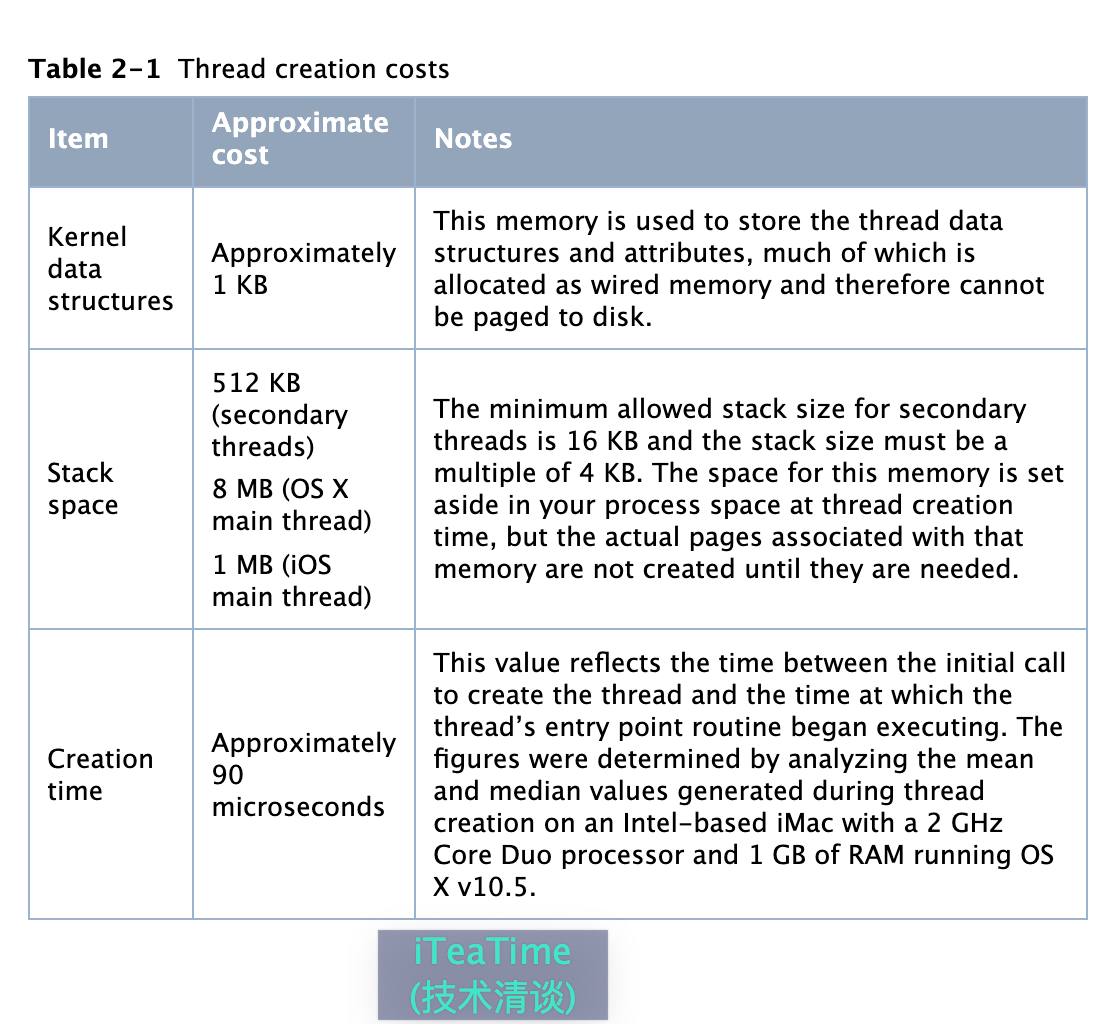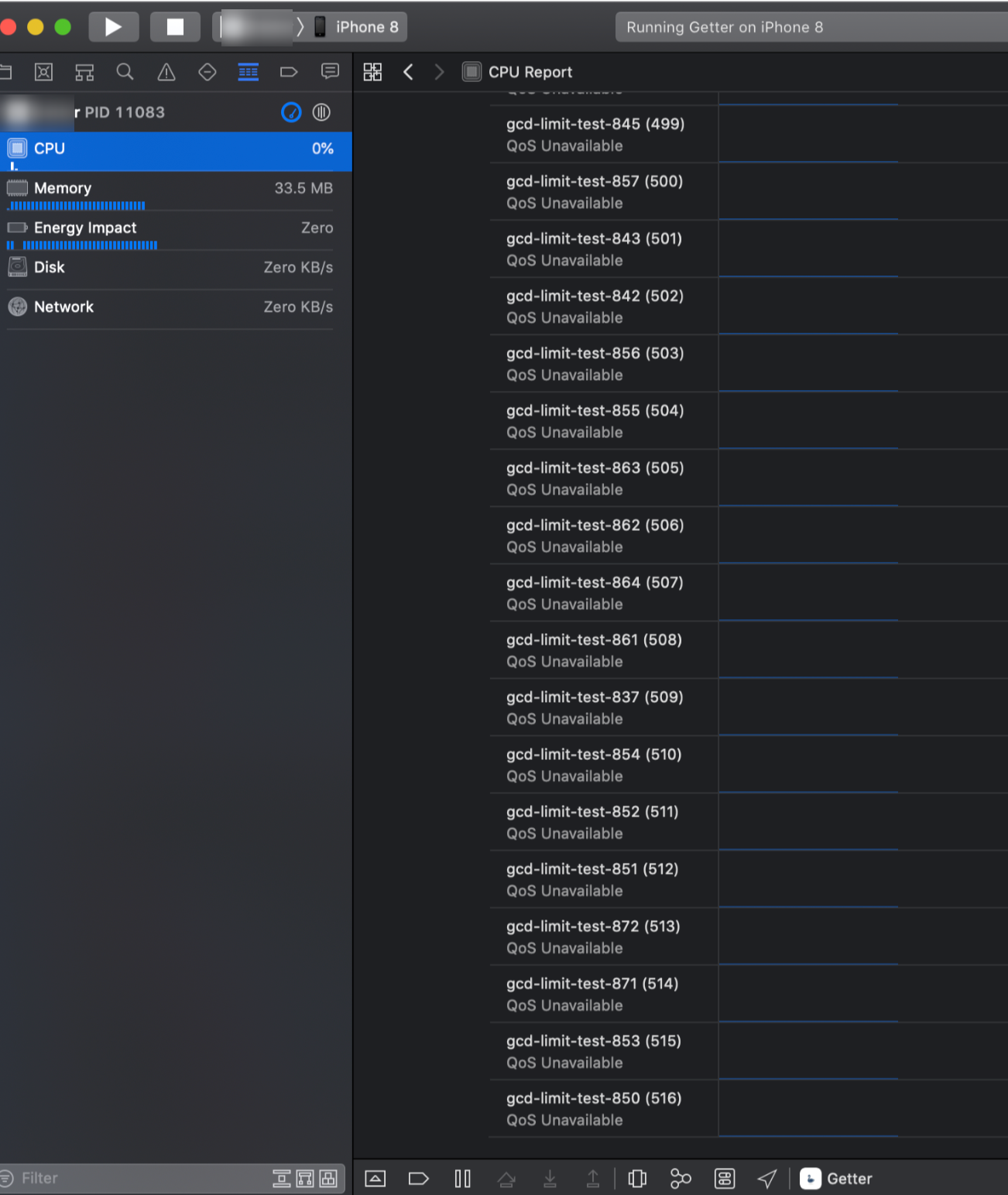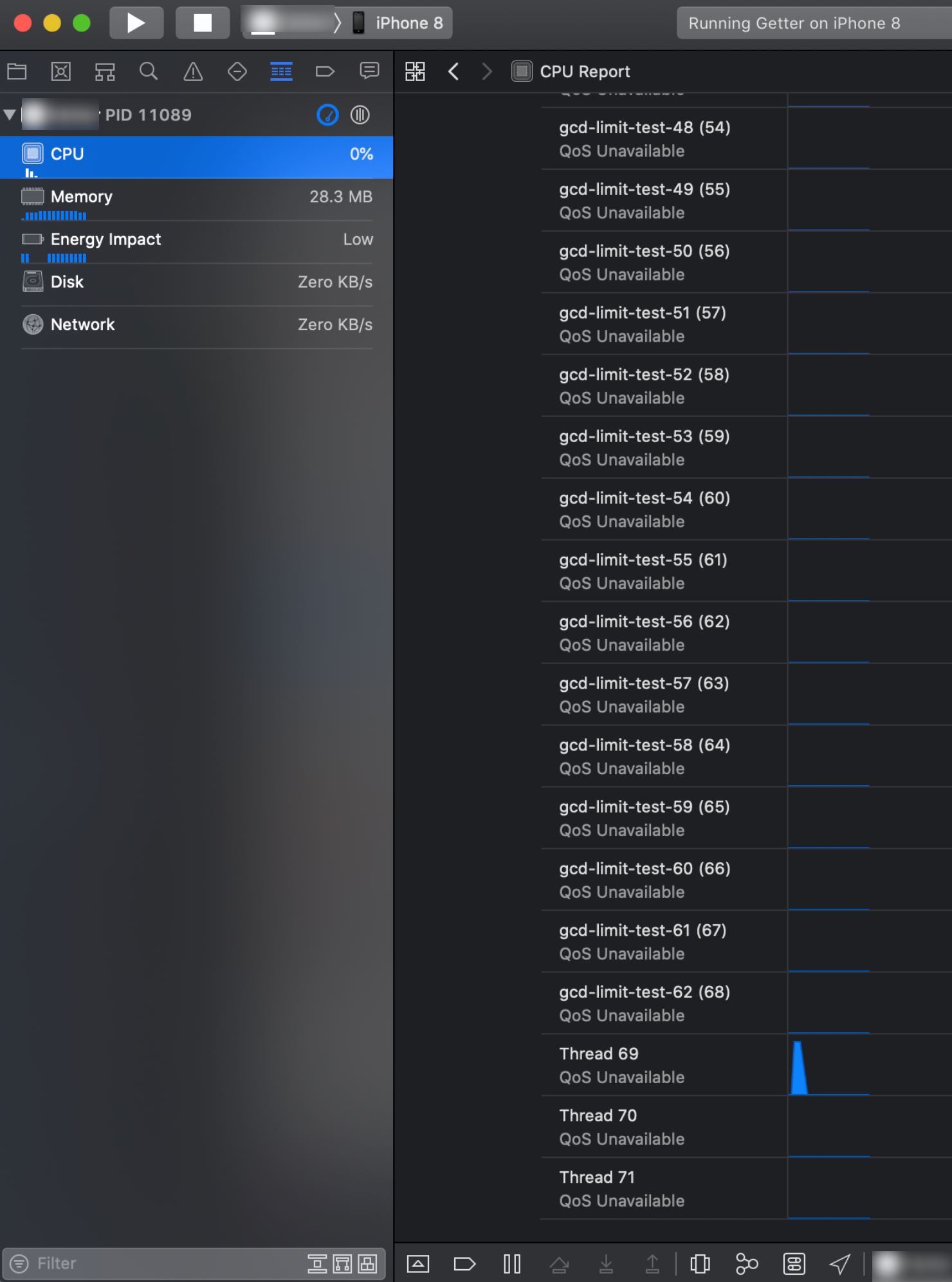Number of threads created by GCD?
First, 66 == 64 (the maximum GCD thread pool size) + the main thread + some other random non-GCD thread.
Second, GCD is not magic. It is optimized for keeping the CPU busy with code that is mostly CPU bound. The "magic" of GCD is that it dynamically create more threads than CPUs when work items unintentionally and briefly wait for operations to complete.
Having said that, code can confuse the GCD scheduler by intentionally sleeping or waiting for events instead of using dispatch sources to wait for events. In these scenarios, the block of work is effectively implementing its own scheduler and therefore GCD must assume that the thread has been co-opted from the thread pool.
In short, the thread pool will operate optimally if your code prefers dispatch_after() over "sleep()" like APIs, and dispatch sources over handcrafted event loops (Unix select()/poll(), Cocoa runloops, or POSIX condition variables).
The answer should be: 512
There are different cases:
All types (Concurrent and serial queues ) can simultaneously create up to 512 threads.
All global queues can create up to 64 threads simultaneously.
As a general rule of thumb,
If the number of threads in an app exceeds 64, it will cause the main thread to lag. In severe cases, it may even trigger a watchdog crash.
This is because there is an overhead in creating threads, and the main costs under iOS are: kernel data structure (about 1KB), stack space (512KB for child threads, 1MB for main threads)
It can also be set using -setStackSize, but it must be a multiple of 4K, and the minimum is 16K, which takes about 90 ms to create a thread.
Opening a large number of threads will reduce the performance of the program. The more threads there are, the more CPU overhead there is to schedule them.
The program design is more complex: communication between threads and data sharing among multiple threads.
First of all, GCD has a limit on the number of threads it can create,
The way gcd creates threads is by calling _pthread_workqueue_addthreads, so there is a limit to the number of threads created. Other ways of creating threads do not call this creation method.
Back to the question above:
All global queues can create up to 64 threads at the same time.
The global queue is added via the _pthread_workqueue_addthreads method. However, there is a limit on the number of threads added using this method in the kernel (plugin).
The specific code for the restriction is shown below:
#define MAX_PTHREAD_SIZE 64*1024
The meaning of this code is as follows:
The total size is limited to 64k, according to Apple-Docs-Threading Programming Guide- Thread creation costs: 1 thread allocates 1k cores, so we can deduce that the result is 64 threads.

In summary, the global queue can create up to 64 threads, which is written dead in the kernel (plugin).
A more detailed test code is as follows:
- Test Environment : iOS 14.3
- Test code
case 1: Global Queue - CPU Busy
In the first test case, we use dispatch_get_global_queue(0, 0) to get a default global queue and simulate CPU busy.
+ (void)printThreadCount {
kern_return_t kr = { 0 };
thread_array_t thread_list = { 0 };
mach_msg_type_number_t thread_count = { 0 };
kr = task_threads(mach_task_self(), &thread_list, &thread_count);
if (kr != KERN_SUCCESS) {
return;
}
NSLog(@"threads count:%@", @(thread_count));
kr = vm_deallocate( mach_task_self(), (vm_offset_t)thread_list, thread_count * sizeof(thread_t) );
if (kr != KERN_SUCCESS) {
return;
}
return;
}
+ (void)test1 {
NSMutableSet<NSThread *> *set = [NSMutableSet set];
for (int i=0; i < 1000; i++) {
dispatch_queue_t queue = dispatch_get_global_queue(0, 0);
dispatch_async(queue, ^{
NSThread *thread = [NSThread currentThread];
[set addObject:[NSThread currentThread]];
dispatch_async(dispatch_get_main_queue(), ^{
NSLog(@"start:%@", thread);
NSLog(@"GCD threads count:%lu",(unsigned long)set.count);
[self printThreadCount];
});
NSDate *date = [NSDate dateWithTimeIntervalSinceNow:10];
long i=0;
while ([date compare:[NSDate date]]) {
i++;
}
[set removeObject:thread];
NSLog(@"end:%@", thread);
});
}
}
Tested: the number of threads is 2
case 2: Global queue - CPU idle
For the second code, we test by [NSThread sleepForTimeInterval:10]; simulating CPU idle
+ (void)test2 {
NSMutableSet<NSThread *> *set = [NSMutableSet set];
for (int i=0; i < 1000; i++) {
dispatch_queue_t queue = dispatch_get_global_queue(0, 0);
dispatch_async(queue, ^{
NSThread *thread = [NSThread currentThread];
[set addObject:[NSThread currentThread]];
dispatch_async(dispatch_get_main_queue(), ^{
NSLog(@"start:%@", thread);
NSLog(@"GCD threads count:%lu",(unsigned long)set.count);
[self printThreadCount];
});
// thread sleep for 10s
[NSThread sleepForTimeInterval:10];
[set removeObject:thread];
NSLog(@"end:%@", thread);
return;
});
}
}
After testing, the maximum number of threads is 64
All concurrent queues and serial queues can create up to 512 threads simultaneously.
A more detailed test code is as follows:
case 1: Self-built Queues - CPU Busy
Now, let us see the performance of the self-built queue - CPU busy. This example will simulate most APP scenarios, where different business parties create separate queues to manage their tasks.
+ (void)test3 {
NSMutableSet<NSThread *> *set = [NSMutableSet set];
for (int i=0; i < 1000; i++) {
const char *label = [NSString stringWithFormat:@"label-:%d", i].UTF8String;
NSLog(@"create:%s", label);
dispatch_queue_t queue = dispatch_queue_create(label, DISPATCH_QUEUE_SERIAL);
dispatch_async(queue, ^{
NSThread *thread = [NSThread currentThread];
[set addObject:[NSThread currentThread]];
dispatch_async(dispatch_get_main_queue(), ^{
static NSInteger lastCount = 0;
if (set.count <= lastCount) {
return;
}
lastCount = set.count;
NSLog(@"begin:%@", thread);
NSLog(@"GCD threads count量:%lu",(unsigned long)set.count);
[self printThreadCount];
});
NSDate *date = [NSDate dateWithTimeIntervalSinceNow:10];
long i=0;
while ([date compare:[NSDate date]]) {
i++;
}
[set removeObject:thread];
NSLog(@"end:%@", thread);
});
}
}
After testing, the maximum number of threads created by GCD is 512
case 2: Self-built queues - CPU idle
+ (void)test4 {
NSMutableSet<NSThread *> *set = [NSMutableSet set];
for (int i=0; i < 10000; i++) {
const char *label = [NSString stringWithFormat:@"label-:%d", i].UTF8String;
NSLog(@"create:%s", label);
dispatch_queue_t queue = dispatch_queue_create(label, DISPATCH_QUEUE_SERIAL);
dispatch_async(queue, ^{
NSThread *thread = [NSThread currentThread];
dispatch_async(dispatch_get_main_queue(), ^{
[set addObject:thread];
static NSInteger lastCount = 0;
if (set.count <= lastCount) {
return;
}
lastCount = set.count;
NSLog(@"begin:%@", thread);
NSLog(@"GCD threads count:%lu",(unsigned long)set.count);
[self printThreadCount];
});
[NSThread sleepForTimeInterval:10];
dispatch_async(dispatch_get_main_queue(), ^{
[set removeObject:thread];
NSLog(@"end:%@", thread);
});
});
}
}
The maximum number of threads created by the self-built queue - CPU idle is 512
Other test code
__block int index = 0;
// one concurrent queue test
dispatch_queue_t queue = dispatch_get_global_queue(0, 0);
for (int i = 0; i < 1000; ++i) {
dispatch_async(queue, ^{
id name = nil;
@synchronized (self) {
name = [NSString stringWithFormat:@"gcd-limit-test-global-concurrent-%d", index];
index += 1;
}
NSThread.currentThread.name = name;
NSLog(@"%@", name);
sleep(100000);
});
}
// some concurrent queues test
for (int i = 0; i < 1000; ++i) {
char buffer[256] = {};
sprintf(buffer, "gcd-limit-test-concurrent-%d", i);
dispatch_queue_t queue = dispatch_queue_create(buffer, DISPATCH_QUEUE_CONCURRENT);
dispatch_async(queue, ^{
id name = nil;
@synchronized (self) {
name = [NSString stringWithFormat:@"gcd-limit-test-concurrent-%d", index];
index += 1;
}
NSThread.currentThread.name = name;
NSLog(@"%@", name);
sleep(100000);
});
}
// some serial queues test
for (int i = 0; i < 1000; ++i) {
char buffer[256] = {};
sprintf(buffer, "gcd-limit-test-%d", i);
dispatch_queue_t queue = dispatch_queue_create(buffer, 0);
dispatch_async(queue, ^{
id name = nil;
@synchronized (self) {
name = [NSString stringWithFormat:@"gcd-limit-test-%d", index];
index += 1;
}
NSThread.currentThread.name = name;
NSLog(@"%@", name);
sleep(100000);
});
}



Special note here:
The 512 mentioned is the limit of gcd. After the 512 gcd threads are opened, you can still open them with NSThread.
So the chart above
Currently it should be 512, 516 = 512(max) + main thread + js thread + web thread + uikit event thread"
Conclusion
After testing, GCD's global queue automatically limits the number of threads to a reasonable number. Compared to this, the number of threads created by the self-built queue is large.
Considering that the number of threads is too large, the CPU scheduling cost will increase.
Therefore, it is recommended that small APPs use a global queue to manage tasks as much as possible; large APPs can decide the suitable solution according to their actual situation.
The documentation avoids mentioning the number of threads created. Mostly because the optimal number of threads depends heavily on the context.
One issue with Grand Cendral Dispatch is that it will spawn a new thread if a running task blocks. That is, you should avoid blocking when using GCD as having more threads than cores is suboptimal.
In your case, GCD detects that the task is inactive, and spawns a new thread for the next task.
Why 66 is the limit is beyond me.